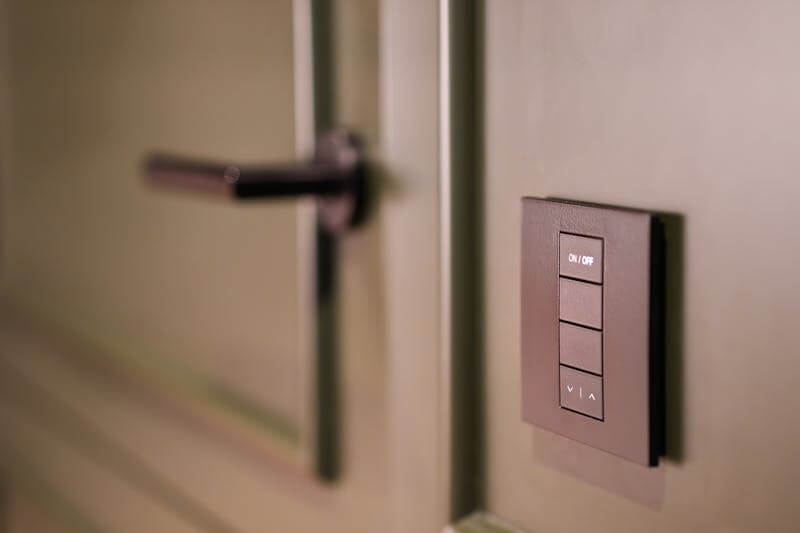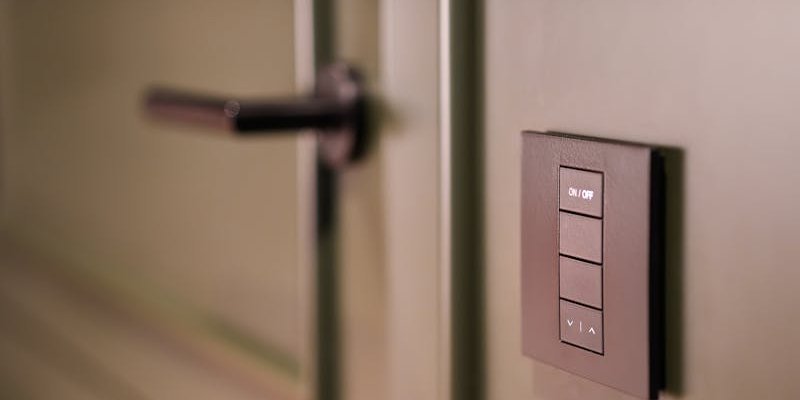Why Smart Door Locks Are a Must-Have for Modern Homes
In an era where convenience, security, and connectivity define modern living, smart home technology has become more than just a trend — it’s an essential part of daily life. Among the many innovations transforming homes, smart door locks stand out as one of the most crucial upgrades homeowners can make. Once viewed as a luxury or futuristic concept, these intelligent security devices are rapidly becoming a must-have for modern households, offering a blend of security, control, and convenience that traditional locks simply can’t match.
This article delves into the numerous reasons why smart door locks are indispensable for today’s homeowners, exploring the technology behind them, their features, benefits, and how they are reshaping home security and lifestyle.

The Evolution of Home Security
Historically, securing a home was as simple as inserting a key into a lock. For decades, the traditional deadbolt remained largely unchanged, offering limited security with an even more limited scope of control. However, as technology evolved, so did the threats. Burglaries became more sophisticated, and the need for more advanced home protection grew.
Enter the smart lock — a digital, internet-connected evolution of the traditional lock, designed not only to secure homes but also to provide real-time insights, remote access, and seamless integration with the broader smart home ecosystem.
What is a Smart Door Lock?
A smart door lock is an electromechanical device that locks and unlocks doors through electronic means such as smartphones, keypads, biometrics (fingerprint recognition), or voice commands. These locks typically connect to home Wi-Fi, Bluetooth, or Zigbee/Z-Wave networks, allowing users to control and monitor their doors remotely via mobile apps or smart assistants like Amazon Alexa, Google Assistant, or Apple HomeKit.
Unlike traditional locks, smart locks provide a wide range of functionalities, from remote access control to activity logs and virtual keys, making them not just a security tool, but a lifestyle enhancement.
Why Smart Door Locks Are a Must-Have
1. Enhanced Security Features
At the core of any smart lock is the promise of better security. Smart locks go beyond the mechanical protections of a standard lock by offering:
- Tamper Alerts: Receive instant notifications if someone tries to tamper with your door.
- Auto-locking: Forget to lock the door on your way out? Smart locks can automatically lock after a preset period.
- Real-time monitoring: View entry and exit logs to see who entered your home and when.
- Two-factor authentication: Some smart locks add layers of security, requiring both a password and biometric verification.
By offering advanced encryption, multiple authentication methods, and live alerts, smart locks provide peace of mind unmatched by conventional locks.
2. Convenience and Remote Access
Gone are the days of fumbling with keys in the dark or making duplicate keys for family and friends. With smart locks:
- Control access from anywhere: Lock or unlock your door from your smartphone, whether you’re at work, on vacation, or in bed.
- Grant remote access: Need to let in a guest, cleaner, or dog walker? You can send them a temporary digital key or unlock the door remotely.
- No need for physical keys: Lose your keys often? Smart locks eliminate the need for them entirely.
This remote flexibility is especially valuable in emergency situations — such as needing to let someone in when you’re not home — and adds a layer of comfort to your daily routine.
3. Customizable Access Control
One of the most powerful features of smart locks is their ability to manage access:
- Create unique codes: Assign unique PINs to family members, friends, babysitters, or service providers.
- Set schedules: Restrict access to specific days and times — ideal for house cleaners or Airbnb guests.
- Revoke access instantly: No more changing locks if someone moves out or loses a key.
This granular control gives homeowners the ability to manage access dynamically and with precision.
4. Integration with Smart Home Ecosystems
Smart locks aren’t standalone devices; they’re integral components of a broader smart home setup. They can seamlessly integrate with:
- Smart doorbells and cameras: View who’s at the door and unlock it remotely.
- Home security systems: Sync with alarms and motion detectors for enhanced security.
- Voice assistants: Lock and unlock doors using voice commands.
- Lighting systems: Trigger lights when the door unlocks at night.
This integration enhances automation and provides an interconnected, intelligent living environment where every device communicates to optimize safety and convenience.
5. Increased Property Value and Appeal
As smart home features become more popular, homes equipped with smart technology — including smart locks — stand out in the market. Buyers and renters are increasingly drawn to homes that offer:
- Enhanced security
- Modern amenities
- Lower insurance premiums due to improved protection
Installing a smart lock not only improves your lifestyle but also adds value to your property in a competitive real estate market.
6. Energy Efficiency and Automation
Though it might not seem obvious, smart locks contribute to overall energy efficiency by integrating with other smart systems:
- Thermostat coordination: Some systems adjust heating/cooling based on when people enter or leave the house.
- Geo-fencing features: Automatically lock doors and adjust lights or appliances when you leave a defined area.
This contributes to both convenience and energy savings, a win-win for homeowners focused on sustainability.
Use Cases: Real-World Applications
1. Busy Families
Parents can assign individual codes to children and monitor when they arrive home. Temporary access can be granted to babysitters or relatives without the hassle of handing over physical keys.
2. Airbnb Hosts
Smart locks are revolutionizing vacation rentals. Hosts can create time-bound access codes for guests, monitor check-in/check-out times, and avoid the complications of lost keys or late arrivals.
3. Elderly or Disabled Residents
Voice-controlled or app-based access can be life-changing for people with mobility challenges. They can unlock the door from their phone, smartwatch, or via voice command without needing to physically reach the door.
4. Frequent Travelers
Traveling often? Smart locks let you secure your home remotely, receive notifications about any activity, and even simulate occupancy by syncing with lights and music to deter intruders.
Key Features to Consider Before Buying a Smart Lock
When shopping for a smart lock, consider the following features:
- Connectivity: Choose between Wi-Fi, Bluetooth, or Zigbee/Z-Wave depending on your smart home setup.
- Power backup: Ensure the lock has battery backup or emergency key override in case of power failure.
- Compatibility: Check that it integrates with your current smart home platform (e.g., Alexa, Google Home).
- Security certifications: Look for ANSI/BHMA certification for assurance of quality and security.
- User management: Make sure it supports enough user codes for your needs.
Common Concerns About Smart Locks — And Why They’re Misplaced
Despite their advantages, some homeowners hesitate to adopt smart locks due to concerns like:
1. “What if it gets hacked?”
While no system is 100% invulnerable, reputable smart lock brands use strong encryption protocols and two-factor authentication. In many cases, smart locks are actually more secure than traditional locks, which can be picked or bumped.
2. “What if the battery dies?”
Smart locks typically send low-battery alerts and have fail-safes like mechanical keyholes or emergency battery ports. Some models even use energy-harvesting technology to operate when batteries are depleted.
3. “Isn’t it complicated to set up?”
Most smart locks are designed with DIY installation in mind, often taking less than 30 minutes to install. The apps are user-friendly, guiding you through setup and management.
The Future of Smart Door Locks
With the rise of AI-powered automation, biometric security, and blockchain-based digital keys, smart locks are poised to become even more advanced. Future models will likely incorporate:
- Facial recognition
- Voice biometrics
- Multi-layered authentication combining biometrics with environmental cues
- Integration with decentralized identity platforms
As homes continue to evolve into smarter ecosystems, the smart lock will remain at the center of this transformation — protecting access while enabling seamless, intelligent living.
Conclusion
Smart door locks are no longer a futuristic luxury — they are an essential component of modern home design. From bolstering security to enhancing convenience and integrating seamlessly with smart home systems, these locks redefine what it means to feel truly in control of your home.
Whether you’re a tech-savvy homeowner or someone simply looking to boost safety and streamline your lifestyle, investing in a smart door lock is a practical, forward-thinking move. As the world becomes increasingly connected, securing your front door with intelligence, not just hardware, is not only smart — it’s necessary.
Frequently Asked Questions (FAQ)
1. Are smart door locks safe from hackers?
Yes — when properly configured, smart locks are very secure. Most reputable brands use AES-128 or AES-256 encryption, two-factor authentication (2FA), and secure cloud communication protocols. While any connected device carries some risk, smart locks from well-established manufacturers are often more secure than traditional locks that can be picked or bumped.
Tips to enhance security:
- Use strong, unique passwords.
- Enable 2FA when available.
- Keep your smart lock’s firmware updated.
2. What happens if the battery dies? Will I get locked out?
No, most smart locks provide low-battery alerts well in advance. Many also offer backup options such as:
- A mechanical keyhole for manual override.
- An emergency power port (e.g., a 9V battery connection).
- Energy-harvesting features that power the lock briefly even when batteries are dead.
Be sure to check your model’s backup features before installation.
3. Can smart locks work without Wi-Fi?
Yes, many smart locks use Bluetooth or Zigbee/Z-Wave and can function offline within a certain range. However, Wi-Fi connectivity is required for full remote access and real-time notifications.
Some locks come with optional Wi-Fi bridges or hubs to connect non-Wi-Fi models to the internet.
4. Can I still use a physical key with a smart lock?
Most smart locks still include a traditional keyhole as a fallback option. However, some minimalist models (like the Level Lock or certain Yale key-free models) eliminate keyholes for aesthetics and rely solely on electronic access. Always check product specs to confirm.
5. Will smart locks fit my current door?
Most smart locks are designed to fit standard U.S. and European deadbolt sizes and can usually be installed over existing locks without needing major modifications. However:
- Measure your door’s thickness and backset before buying.
- Check if the lock supports inward or outward swinging doors.
- Make sure it supports left-hand or right-hand orientation, depending on your door.
6. Do smart locks work with voice assistants like Alexa or Google Assistant?
Yes. Many smart locks are compatible with popular smart home ecosystems:
- Amazon Alexa: Lock/unlock doors via voice or routines.
- Google Assistant: Control access through Google Home apps or devices.
- Apple HomeKit: Seamless control for iPhone/iPad users.
Check compatibility with your preferred platform before purchasing.
7. How do smart locks help with Airbnb or rental properties?
Smart locks are ideal for short-term rentals. Benefits include:
- Sending temporary or time-limited access codes to guests.
- Monitoring check-in and check-out times remotely.
- No need for key exchanges or worrying about lost keys.
Some smart locks also integrate with platforms like Airbnb, automating code generation and delivery.

